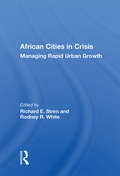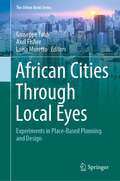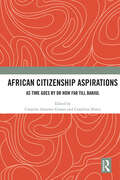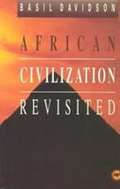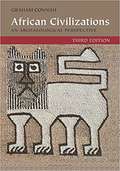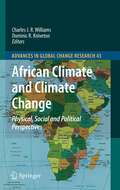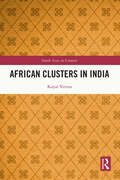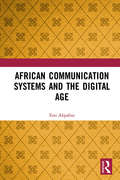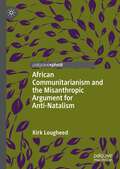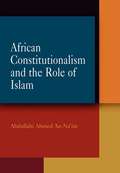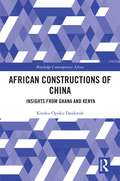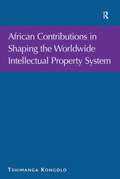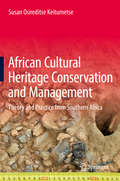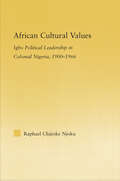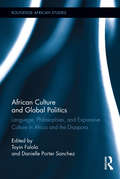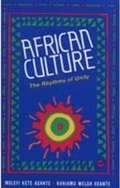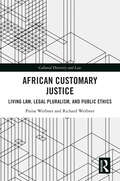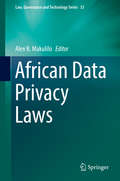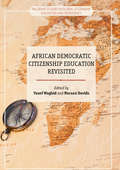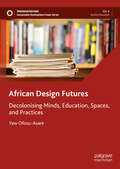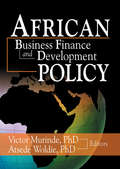- Table View
- List View
African Cities In Crisis: Managing Rapid Urban Growth
by Rodney R. White Richard E. StrenThis book presents the results of the "African Urban Management" project designed to study comparatively governmental responses to the gap between the realities of official plans and perspectives and the mushrooming world of the urban poor in African cities.
African Cities Through Local Eyes: Experiments in Place-Based Planning and Design (The Urban Book Series)
by Giuseppe Faldi Axel Fisher Luisa MorettoThis book provides readers with a wide overview of place-based planning and design experiments addressing such powerful transformations in the African built environment. This continent is currently undergoing fast paced urban, institutional and environmental changes, which have stimulated an increasing interest for alternative architectural solutions, urban designs and comprehensive planning experiments. The international and balanced array of the collected contributions explore emerging research concepts for understanding urban and peri-urban processes in Africa, discuss bottom-up planning and design practices, and present inspirational and innovative co-design methods and participatory tools for steering such change through public spaces, sustainable services and infrastructures. The book is intended for students, researchers, decision-makers and practitioners engaged in planning and design for the built environment in Africa and the Global South at large.
African Citizenship Aspirations: As Time Goes By or How Far Till Banjul
by Catarina Antunes Gomes Cesaltina AbreuThis collective work aims to critically reflect upon contemporary citizenship aspirations and practices in sub-Saharan Africa. Focusing on different realities, such as Angola, Mozambique and the Great Lakes region, it tries to unveil multiple historical commonalities, especially those arising from shared experiences of postcolonial violence and vulnerability. Thus, albeit the social realities under scrutiny cannot stand for the complexity of the Continent, the studies here gathered enlighten similar processes that can be identified in many other African contexts. That is certainly the case of the proliferation of religious manifestations and democratic demands that are currently being articulated in different countries such as Burundi, Central African Republic, Ethiopia, Sudan, Uganda and Nigeria.One such commonality can be referred to as a quest for being. Indeed, this quest for being has always underpinned African discourses and practices, either in postcolonial approaches, either in intellectual traditions, either in popular productions. These multiple practices reveal how, in certain circumstances, identity, as a product of historical wills of knowledge, power and truth, can be questioned as a site of possession and entrapment. How is one to be beyond colonial possession? Or beyond postcolonial authoritarian rule? Or beyond eurocentrism? African quests for being have always been quests for freedom. And they impose a debate on regimes of citizenship. Active citizenship is not merely a by-product of formal political systems; it is one that challenges them from the outside while actualizing the lessons of historical liberation struggles. As times goes by, the right to be still stands.The chapters of this book were originally published as a special issue in Citizenship Studies.
African Civilization Revisited: From Antiquity to Modern Times
by Basil DavidsonA classic book on African history as told in the, chronicles and records of chiefs and kings, travelers and merchants.
African Civilizations
by Graham ConnahThis edition of African Civilizations, first published in 2001, re-examines the physical evidence for developing social complexity in tropical Africa over the last four thousand years. Graham Connah focuses upon the archaeological research of two key aspects of complexity, urbanism and state formation, in seven main areas of Africa: Nubia, Ethiopia, the West African savanna, the West African forest, the East African coast and islands, the Zimbabwe Plateau, and parts of Central Africa. The book's main concern is to review the available evidence in its varied environmental setting, and to consider possible explanations of the developments that gave rise to it. Extensively illustrated, including new maps and plans, and offering an extended bibliography, this book provides essential reading for students of archaeology, anthropology, African history, black studies, and social geography.
African Climate and Climate Change: Physical, Social and Political Perspectives (Advances in Global Change Research #43)
by Charles J. Williams Dominic R. KnivetonCompared to many other regions of the world, Africa is particularly vulnerable to the effects of climate change and variability. Widespread poverty, an extensive disease burden and pockets of political instability across the continent has resulted in a low resilience and limited adaptative capacity of African society to climate related shocks and stresses. To compound this vulnerability, there remains large knowledge gaps on African climate, manifestations of future climate change and variability for the region and the associated problems of climate change impacts. Research on the subject of African climate change requires an interdisciplinary approach linking studies of environmental, political and socio-economic spheres. In this book we use different case studies on climate change and variability in Africa to illustrate different approaches to the study of climate change in Africa from across the spectrum of physical, social and political sciences. In doing so we attempt to highlight a toolbox of methodologies (along with their limitations and advantages) that may be used to further the understanding of the impacts of climate change in Africa and thus help form the basis for strategies to negate the negative implications of climate change on society.
African Clusters in India (South Asia in Context)
by Koyal VermaAfrican Clusters in India examines the discrimination and stereotypes faced by the African migrants in India. It outlines the narratives of the migrants and demonstrates how their ‘African identity’ gets associated with drugs, prostitution, and cannibalism. The book brings to the fore how the African migrants experience racial profiling based on a conflated African identity, and how this identity gets generalised irrespective of their different nationalities and leads to social exclusion. This monograph argues that the antagonistic urban environment facilitates the formation of a pan-African identity as a response to biases and stereotypes. It also explores the role of language, culture, and politics of representation to show the process of othering and exclusion in India. Drawing on lived experiences of the migrants, the volume engages with the larger discourse of globalization, liberalisation, and migration within the global south. It will be of great interest to scholars and researchers of critical race theory, ethnography, urban sociology, African studies, and South Asian studies
African Coalitions and Global Economic Governance
by Nelson Michael ByronThe proliferation of international institutions with overlapping scope and authority over issue areas creates strategic dilemmas for all states. While African states are often considered marginalised in world politics and global markets, Michael Byron Nelson shows how coalitions can form a crucial part of African strategies to influence international institutions and achieve results. Building a bottom-up analysis of global governance, through legal analysis, content analysis, and in-depth interviews, Nelson illuminates institutional and coalition dynamics through case studies of three key areas - food safety, intellectual property, and agricultural trade. He highlights the difficulties encountered by coalitions attempting to navigate institutional systems, emerging from institutional thickness (increasing the number of institutions involved) and integration (increasing the formal linkages between those institutions). Finally, Nelson shows how increasing the hierarchy of an institutional system, by creating a focal point on a single institution, can make coordination easier for coalitions.
African Communication Systems and the Digital Age
by Eno Ime AkpabioThe book covers African communication systems, discussing modes and forms of communication across West, East and Southern Africa and comparing them with traditional and new media. African Communication Systems and the Digital Age contextualizes communication by bringing to the table African contributions to the field, examining the importance of African indigenous forms of communication and the intersection of African communication systems and the digital age. The book covers various concepts, models, theories and classifications of African communication systems, including instrumental communication, types of African music and their communication properties, indigenous writing systems, non-verbal communication, and mythological communication. Through careful analysis of communication in Africa, this book provides insights into the various modes of communication in use prior to the advent of traditional and new media as well as their continued relevance in the digital age. African Communication Systems and the Digital Age will be of interest to students and scholars of African communication.
African Communications Group
by Anita M. Mcgahan Dale O. CoxeDescribes the opportunities that confront the African Communications Group, an entrepreneurial organization that plans to introduce a wireless pay-phone system in Tanzania. Provides a foundation for the analysis of value creation and of value capture. The possibility of entry by other companies, the presence of a large supplier, and uncertainties about demand all create important tradeoffs for the new venture.
African Communitarianism and the Misanthropic Argument for Anti-Natalism
by Kirk LougheedAnti-natalism is the provocative view that it is either always or almost always all-things-considered wrong to procreate. Philanthropic anti-natalist arguments say that procreation is always impermissible because of the harm done to individuals who are brought into existence. Misanthropic arguments, on the other hand, hold that procreation is usually impermissible given the harm that individuals will do once brought into existence. The main purpose of this short monograph is to demonstrate that David Benatar’s misanthropic argument for anti-natalism ought to be endorsed by any version of African Communitarianism. Not only that, but there are also resources in the African philosophical tradition that offer unique support for the argument. Given the emphasis that indigenous African worldviews place on the importance of procreation and the immediate family unit this result is highly surprising. This book marks the first attempt to bring anti-natalism into conversation with contemporary African ethics.
African Constitutionalism and the Role of Islam
by Abdullahi Ahmed An-Na'imConstitutionalism is steadily becoming the prevalent form of governance in Africa. But how does constitutionalism deal with the lingering effects of colonialism? And how does constitutional law deal with Islamic principles in the region? African Constitutionalism and the Role of Islam seeks to answer these questions. Constitutional governance has not been, nor will be, easily achieved, Abdullahi Ahmed An-Na'im argues. But setbacks and difficulties are to be expected in the process of adaptation and indigenization of an essentially alien concept--that of of nation-state--and its role in large-scale political and social organization.An-Na'im discusses the problems of implementing constitutionalized forms of government specific to Africa, from definitional to conceptual and practical issues. The role of Islam in these endeavors is open to challenge and reformulation, and should not be taken for granted or assumed to be necessarily negative or positive, An-Na'im asserts, and he emphasizes the role of the agency of Muslims in the process of adapting constitutionalism to the values and practices of their own societies. By examining the incremental successes that some African nations have already achieved and An-Na'im reveals the contingent role that Islam has to play in this process. Ultimately, these issues will determine the long-term sustainability of constitutionalism in Africa.
African Constructions of China: Insights from Ghana and Kenya (Routledge Contemporary Africa)
by Kwaku Opoku DankwahMarking a constructivist turn in Africa-China scholarship, this book explores African constructions of China. Using Ghana and Kenya as case studies, the book outlines the role of diverse state and non-state actors in defining what China represents to the region, and how it compares to Western powers. Resisting Sino- and state-centric analysis of China-Africa relations, this book emphasises the importance of African agency in shaping the discourse. The book demonstrates that the identity construction of a foreign state such as China takes place both at the international level, and at a domestic, intrastate level. Domestic constructions of China in Ghana and Kenya reflect internal tensions about future directions for African political and socio-economic development, and these constructions in turn help to justify government policies towards China. The book concludes by questioning the idea of a straightforward win-win relationship, and suggests that exploitative, hierarchical relations conventionally associated with North-South interactions may continue in South-South relations. This book’s important analysis of the role of domestic non-state actors in shaping African policymaking extends much needed nuance to a sometimes polarised debate. It will be of interest to researchers across the fields of politics, international relations, global development, and African and Chinese Studies.
African Contributions in Shaping the Worldwide Intellectual Property System
by Tshimanga KongoloAfrica is playing an increasingly more significant role in the domain of international intellectual property law, and this book underlines the contributions made by African countries as a group to the development of the current international IP system. It examines in detail their breakthrough proposals and initiatives at the WTO, WIPO and WHO with regard to IP and public health; IP and traditional knowledge, traditional cultural expressions and genetic resources; IP and biodiversity; and exceptions and limitations to copyright. Using Botswana, Burundi, Egypt, Ghana, Kenya, Mauritius, Morocco, South Africa and Tunisia as examples, it examines the systems under which these IP subject matters are protected. From a regional perspective, the book also analyses some initiatives taken by ARIPO, OAPI and the African Union to protect traditional knowledge and traditional cultural expressions, especially in relation to protection of the rights of local farming communities and breeders, regulation of access to biological resources, genetically modified organisms and the proposed establishment of the new Pan-African Intellectual Property Organization (PAIPO). Demonstrating how Africa is now an active player on the international IP scene, this book will be invaluable to those interested in intellectual property law, business and commercial law, and African and international law.
African Cultural Heritage Conservation and Management: Theory and Practice from Southern Africa
by Susan Osireditse KeitumetseFor a long time, resource conservationists have viewed environmental conservation as synonymous with wilderness and wildlife resources only, oblivious to the contributions made by cultural and heritage resources. However, cultural heritage resources in many parts of the developing world are gradually becoming key in social (e. g. communities' identities and museums), economic (heritage tourism and eco-tourism), educational (curriculum development), civic (intergenerational awareness), and international resources management (e. g. UNESCO). In universities, African cultural heritage resources are facing a challenge of being brought into various academic discourses and syllabi in a rather reactive and/or haphazard approach, resulting in failure to fully address and research these resources' conservation needs to ensure that their use in multiple platforms and by various stakeholders is sustainable. This book seeks to place African cultural heritage studies and conservation practices within an international and modern world discourse of conservation by presenting its varied themes and topics that are important for the development of the wider field of cultural heritage studies and management.
African Cultural Values: Igbo Political Leadership in Colonial Nigeria, 1900–1996 (African Studies)
by Raphael Chijoke NjokuAlthough numerous studies have been made of the Western educated political elite of colonial Nigeria in particular, and of Africa in general, very few have approached the study from a perspective that analyzes the impacts of indigenous institutions on the lives, values, and ideas of these individuals. This book is about the diachronic impact of indigenous and Western agencies in the upbringing, socialization, and careers of the colonial Igbo political elite of southeastern Nigeria. The thesis argues that the new elite manifests the continuity of traditions and culture and therefore their leadership values and the impact they brought on African society cannot be fully understood without looking closely at their lived experiences in those indigenous institutions where African life coheres. The key has been to explore this question at the level of biography, set in the context of a carefully reconstructed social history of the particular local communities surrounding the elite figures. It starts from an understanding of their family and village life, and moves forward striving to balance the familiar account of these individuals in public life, with an account of the ongoing influences from family, kinship, age grades, marriage and gender roles, secret societies, the church, local leaders and others. The result is not only a model of a new approach to African elite history, but also an argument about how to understand these emergent leaders and their peers as individuals who shared with their fellow Africans a dynamic and complex set of values that evolved over the six decades of colonialism.
African Culture and Global Politics: Language, Philosophies, and Expressive Culture in Africa and the Diaspora (Routledge African Studies)
by Toyin Falola Danielle Porter SanchezThis volume attempts to insert itself within the larger discussion of Africa in the twenty-first century, especially within the realm of world politics. Despite the underwhelming amount of attention given to Africa's role in international politics in popular news sources, it is evident that Africa has a consistent record of participating in world politics- one that pre-dates colonization and continues today. In continuance of this legacy of active participation in global political exchanges, Africans today can be heard in dialogues that span the world and their roles are impossible to replace by other entities. It is evident that a vastly different Africa exists than ones that bolster images of starvation, corruption, and compliance. The essays in this volume center on Africa and Africans participating in international political discourses, but with an emphasis on various forms of expression and philosophies, as these factors heavily influence Africa's role as a participant in global politics. The reader will find a variety of essays that permeate surface discussions of politics and political activism by inserting African culture, rhetoric, philosophies into the larger discussion of international politics and Africa's role in worldwide political, social, and economic debates.
African Culture: The Rhythms of Unity
by Molefi Kete Asante Kariamu Welsh AsanteKey voices in the African world discuss differences and similarities in African culture.
African Customary Justice: Living Law, Legal Pluralism, and Public Ethics (Cultural Diversity and Law)
by Richard Werbner Pnina WerbnerThis book presents an important ethnographic and theoretical advance in legal anthropological scholarship by interrogating customary law, customary courts and legal pluralism in sub-Saharan Africa. It highlights the vitality and continued relevance of customary justice at a time when customary courts have waned or even disappeared in many postcolonial African nations. Taking Botswana as a casestudy from in-depth fieldwork over a fifty-year period, the book shows, the ‘customary’ is robustly enduring, central to settling interpersonal disputes and constitutive of the local as well as the national public ethics. Customary law continues to be constitutionally protected, authorised by the country’s past as an authentic, viable legacy, from the British colonial period of indirect rule to the postcolonial state’s present development as a highly bureaucratised democracy. Along with a theoretical overview of the underlying issues for the anthropology and sociology of law, the book documents customary law as living law in the context of legal pluralism. It takes a legal realist approach and highlights the need to pay close attention to the lived experience of justice and its role in the production of legal subjectivities. The book will be valuable to Africanists but also, more broadly, to social scientists, social historians and socio-legal scholars with interests in law and social change, public ethics and personal morality, and the intersection of politics and judicial decision making.
African Data Privacy Laws (Law, Governance and Technology Series #33)
by Alex B. MakuliloThis volume presents analyses of data protection systems and of 26 jurisdictions with data protection legislation in Africa, as well as additional selected countries without comprehensive data protection laws. In addition, it covers all sub-regional and regional data privacy policies in Africa. Apart from analysing data protection law, the book focuses on the socio-economic contexts, political settings and legal culture in which such laws developed and operate. It bases its analyses on the African legal culture and comparative international data privacy law. In Africa protection of personal data, the central preoccupation of data privacy laws, is on the policy agenda. The recently adopted African Union Cyber Security and Data Protection Convention 2014, which is the first and currently the only single treaty across the globe to address data protection outside Europe, serves as an illustration of such interest. In addition, there are data protection frameworks at sub-regional levels for West Africa, East Africa and Southern Africa. Similarly, laws on protection of personal data are increasingly being adopted at national plane. Yet despite these data privacy law reforms there is very little literature about data privacy law in Africa and its recent developments. This book fills that gap.
African Democratic Citizenship Education Revisited (Palgrave Studies in Global Citizenship Education and Democracy)
by Nuraan Davids Yusef WaghidThis edited collection explores how democratic citizenship education manifests across the African continent. A recognition of rights and responsibilities coupled with an emphasis on deliberative engagement among citizens, while not uniquely African, provides ample evidence that the concept can most appropriately be realised in relation to its connectedness with experiences of people living on the continent. Focussing on a diverse collection of voices, the editors and authors examine countries that have an overwhelming allegiance to democratic citizenship education. In doing so, they acknowledge that this concept, enveloped by a certain Africanness, has the potential to manifest in practices across the African continent. By highlighting the success of democratic citizenship education, the diverse and varied contributions from across this vast continent address the malaise in its implementation in countries where autocratic rule prevails. This pioneering volume will be an invaluable resource for researchers and students working in the fields of education and sociology, particularly those with an interest in education policy, philosophy of education and global citizenship initiatives.
African Department: Expenditure Composition and Economic Development in Benin
by Marco Pani Mohamed El HarrakThis paper estimates how changes in the composition of public expenditure affect growth, employment, and income inequality in Benin. These estimates are based on a model of labor market segmentation with partial labor mobility along the lines of Harris and Todaro (1970). The model is calibrated to fit the data for the Beninese economy over the period 2003-07. Despite some data limitation, the results obtained suggest that a shift in the composition of expenditure from wages to public investment would have beneficial effects on growth, employment, and income equality, particularly through its effects on wages and labor demand in the private formal sector; conversely, an increase in civil servants' wages, even if it were financed by grants, could result in lower growth, higher unemployment, and larger wage disparities across sectors.
African Department: Wage Policy and Fiscal Sustainability in Benin
by Charlotte LundgrenFinancial report from the IMF
African Design Futures: Decolonising Minds, Education, Spaces, and Practices (Sustainable Development Goals Series)
by Yaw Ofosu-AsareThis book responds to the question "Is it time to reimagine design education in Africa and decolonise our creative future?" The proposed volume is designed to provide a source of inspiration to readers in imagining their own futures within fields of Creative industries such as performative art, architecture design, industrial design, media production, drawing and illustration, filmmaking, design, documentary, virtual reality, and others. With a focus on decolonising design education in Africa, this book will challenge the dominant capitalist narrative and centre on the needs of African communities. It will provide insights into the challenges and opportunities of decolonising design education and propose alternative models for design education that promote social and environmental sustainability, cultural preservation, and community empowerment. Collectively, the proposed book's accounts bring to life the career possibilities within a rapidly expanding global sector of creativity and innovation with immense cultural, social, political, and economic impact. By exploring new models of creative practice and education that centre on social impact, cultural relevance, and community empowerment, this book will inspire readers to think critically about their own futures in the Creative Industries in Africa.
African Development Finance and Business Finance Policy
by Atsede Woldie Victor MurindeFinancial plans that stimulate growth and eliminate poverty in developing African countries! African Developmental Finance and Business Finance Policy presents theoretical/conceptual and empirical articles that provide invaluable insights into successful business techniques and strategies for the African business arena-the last great frontier of international business expansion. Researchers and practitioners in the field of developmental finance discuss the design and implementation of financial policies for pro-poor growth and poverty alienation in developing countries, including Kenya, Zambia, Nigeria, Mauritius, and Zimbabwe. The book focuses on banking, business finance, and investment, detailing strategies for coping with a small financial system, bank licensing policies, correction action rules, quality of banking services, and the revitalization of the African stock exchange. African Developmental Finance and Business Finance Policy features papers presented on key policy issues addressed at the April 2001 international conference of the Institute for Developmental Policy and Management at the University of Manchester in England. Topics addressed include: financial regulation, interest rates bank ownership regulatory forbearance emerging stock markets determinants of capital structure financial reform and much more! Targeted to policymakers in government and international agencies, academics, consultants, and executives, African Developmental Finance and Business Finance Policy is an essential resource for advancing and communicating research on developmental policy in developing countries.
